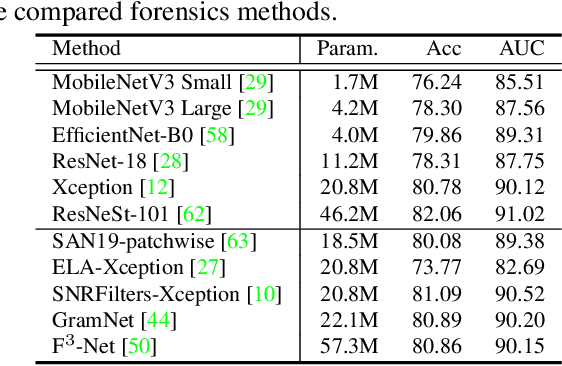ForgeryNet: A Versatile Benchmark for Comprehensive Forgery Analysis
Paper and Code
Mar 09, 2021



The rapid progress of photorealistic synthesis techniques has reached at a critical point where the boundary between real and manipulated images starts to blur. Thus, benchmarking and advancing digital forgery analysis have become a pressing issue. However, existing face forgery datasets either have limited diversity or only support coarse-grained analysis. To counter this emerging threat, we construct the ForgeryNet dataset, an extremely large face forgery dataset with unified annotations in image- and video-level data across four tasks: 1) Image Forgery Classification, including two-way (real / fake), three-way (real / fake with identity-replaced forgery approaches / fake with identity-remained forgery approaches), and n-way (real and 15 respective forgery approaches) classification. 2) Spatial Forgery Localization, which segments the manipulated area of fake images compared to their corresponding source real images. 3) Video Forgery Classification, which re-defines the video-level forgery classification with manipulated frames in random positions. This task is important because attackers in real world are free to manipulate any target frame. and 4) Temporal Forgery Localization, to localize the temporal segments which are manipulated. ForgeryNet is by far the largest publicly available deep face forgery dataset in terms of data-scale (2.9 million images, 221,247 videos), manipulations (7 image-level approaches, 8 video-level approaches), perturbations (36 independent and more mixed perturbations) and annotations (6.3 million classification labels, 2.9 million manipulated area annotations and 221,247 temporal forgery segment labels). We perform extensive benchmarking and studies of existing face forensics methods and obtain several valuable observations.
 Add to Chrome
Add to Chrome Add to Firefox
Add to Firefox Add to Edge
Add to Edge